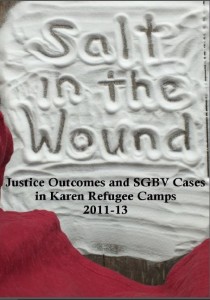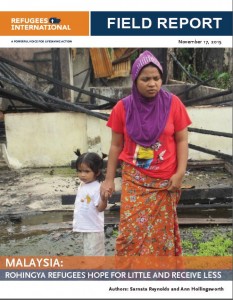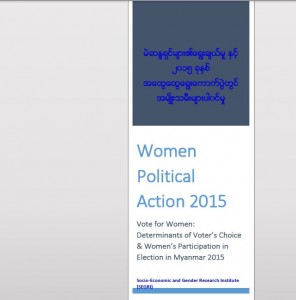Resources (827 found)
KWO New Report: Salt In The Wound
All women and girls, no matter where they live, have the fundamental right to be free from violence. This Report examined the extent to which women and girls who live in  the seven Karen-majority camps along the Thai-Burma border enjoy, and can exercise, this fundamental human right. Specifically, this study examined 289 cases of Sexual and Gender-Based Violence (SGBV) against women in Mae Ra Ma Luang, Mae La Oon, Mae La, Umpiem Mai, Noh Poe, Ban Don Yang and Htam Hin refugee camps from 2011 to 2013 to determine the factors contributing to official reporting of crimes as well as the justice system’s response to such crimes […]
the seven Karen-majority camps along the Thai-Burma border enjoy, and can exercise, this fundamental human right. Specifically, this study examined 289 cases of Sexual and Gender-Based Violence (SGBV) against women in Mae Ra Ma Luang, Mae La Oon, Mae La, Umpiem Mai, Noh Poe, Ban Don Yang and Htam Hin refugee camps from 2011 to 2013 to determine the factors contributing to official reporting of crimes as well as the justice system’s response to such crimes […]
Burma Army Shelling and Aerial Bombing of 6,000 Civilians in Mong Nawng Town are War Crimes
The Shan Human Rights Foundation strongly condemns the Burma Army shelling and aerial bombing of Mong Nawng town in central Shan State between November 9 and 12, 2015. The firing of shells and bombs directly into the centre of this densely populated town of 6,000 people, damaging houses and causing civilian injury, meets the definition […]
• • •Malaysia: Rohingya Refugees Hope for Little and Receive Less
 It’s been six months since as many as 1,000 Rohingya fleeing from Myanmar died in the Andaman Sea. And still, neighboring nations remain resistant to recognizing the Rohingya people’s rights as refugees. Even after neighboring governments met earlier this year and agreed to protect the Rohingya at sea, no nation has taken a leadership role in permitting them to disembark from boats safely and legally. The absence of a regional plan leaves the Rohingya vulnerable to the challenges of a perilous sea voyage, and further strands those Rohingya who have lived in Malaysia and other regional nations for up to three generations without legal rights or protection. Without a doubt, Myanmar is creating this crisis […]
It’s been six months since as many as 1,000 Rohingya fleeing from Myanmar died in the Andaman Sea. And still, neighboring nations remain resistant to recognizing the Rohingya people’s rights as refugees. Even after neighboring governments met earlier this year and agreed to protect the Rohingya at sea, no nation has taken a leadership role in permitting them to disembark from boats safely and legally. The absence of a regional plan leaves the Rohingya vulnerable to the challenges of a perilous sea voyage, and further strands those Rohingya who have lived in Malaysia and other regional nations for up to three generations without legal rights or protection. Without a doubt, Myanmar is creating this crisis […]
Burma/Myanmar Post-election Outlook: Trials for Triumph
Results announced on 13 November confirmed the overwhelming victory of the National League for Democracy (NLD) in the 8 November elections, which decided 75% of seats in Burma/Myanmar’s National and Regional Parliaments. While the military will retain its allotted 25% of parliamentary seats, the NLD now holds an overall majority in the National Parliament, giving it the power to form Burma/Myanmar’s next government and select a President […]
• • •Asian Forum for Human Rights and Development: Burma/Myanmar Elections Preliminary Findings
(Yangon, 10 November 2015) From 2-10 November 2015, the Asian Forum for Human Rights and Development (FORUM-ASIA), together with its Thai member, the People’s Empowerment Foundation (PEF) conducted an election observation mission in Yangon, Burma/Myanmar […]
• • •Burma Army troops shoot at farmers in central Shan State on election day, seriously injuring a woman and boy
On November 8, 2015, general election day in Burma, government troops shot at a group of farmers returning from harvesting their rice fields in Mong Nawng, central Shan State. A 55-year-old woman and a 15-year-old boy were seriously injured […]
• • •Burma/Myanmar Election Day: Free-est & Fairest Is Not Free & Fair
On 8 November, Burma/Myanmar held what has been called its “free-est and fairest” election in 25 years. An 80% turnout rate was reported for the 33.5 million Burmese eligible to vote in the election, which saw the first participation of democracy leader Aung San Suu Kyi’s National League for Democracy (NLD) in a general election since the (later annulled) 1990 elections […]
• • •Burma/Myanmar’s 2015 Elections: Obstacles to Inclusive, Credible and Free and Fair Elections
The Union Election Commission (UEC) has received criticism for publishing voter lists that contain numerous errors and for being unable to adequately correct their mistakes. During the initial release of voter lists, complainants noted that the UEC had excluded a number of eligible voters, included voters who were deceased, and printed a number of incorrect information such as birth dates[1]. A subsequent release of voter lists, which the UEC released in order to rectify previous errors, contained further inaccuracies including additional voter exclusions[2]. A particularly drastic example of the incorrect voter lists is the case of Hlaing Tharyar Township, in which 200,000 voters were mysteriously excluded[3]. While there have been numerous cases where citizens have reported incorrect voter lists in remote and rural ethnic areas, such as in Karen State, some villagers do not report to local authorities to have them correct the information due to fear of reprisal […]
• • •မဲဆႏၵရွင္မ်ား၏ေရြးခ်ယ္မႈ ႏွင့္ ၂၀၁၅ ခုႏွစ္ အေထြေထြေရြးေကာက္ပြဲတြင္အမ်ိဳးသမီးမ်ားပါ၀င္မႈ
ၿမန္မာ့ႏူိင္ငံေရးသမုိင္းစဥ္တစ္ေလ်ာက္တြင္ အမ်ိဳးသမီးမ်ားသည္ အၿခားေသာႏူိင္ငံမ်ားနည္းတူ ေရြး ေကာက္ခံကုိယ္စားလွယ္၊ မဲေပးသူ၊ ကုိယ္စားလွယ္ေလာင္း၊ ႏွင့္ တက္ၾကြႏူိးၾကားမႈရွိေသာ ႏူိင္ငံသားမ်ားအၿဖစ္ၿဖင့္ ပါ၀င္ေနခဲ့ၾကသည္။ ၂၀၁၂ ခုႏွစ္ ၾကားၿဖတ္ေရြးေကာက္ပြဲအၿပီးရရွိေသာ ကိန္းဂဏန္း မ်ားအရ ၿပည္ေထာင္စုလႊတ္ေတာ္ႏွင့္  ၿပည္နယ္ ႏွင့္တုိင္းေဒသၾကီးလႊတ္ေတာ္ ႏွစ္ရပ္ စလုံး၌ အမ်ိဳးသမီးလႊတ္ေတာ္ကုိယ္စားလွယ္ ၅၃ ဦး (၄.၆%) ပါ၀င္ၿပီး ၿပည္သူ႔လႊတ္ေတာ္တြင္ ၂၅ ဦး (၇.၈%)၊ အမ်ိဳးသားလႊတ္ေတာ္တြင္ ၄ ဦး (၂.၄%)၊ ၿပည္နယ္ႏွင့္ တုိင္းေဒသၾကီး လႊတ္ေတာ္ တြင္ ၂၄ ဦး (၃.၆%) ရွိသည္ၿဖစ္ရာ က်ားမတန္းတူညီမွ်ေရးအတြက္ အနိမ့္ဆုံးလုိအပ္ခ်က္ၿဖစ္ သည့္ အၿပည္ၿပည္ဆုိင္ရာ စံႏႈန္း ၃၀% ၿပည့္မွီရန္ မ်ားစြာလုိပါေသးသည္ […]
ၿပည္နယ္ ႏွင့္တုိင္းေဒသၾကီးလႊတ္ေတာ္ ႏွစ္ရပ္ စလုံး၌ အမ်ိဳးသမီးလႊတ္ေတာ္ကုိယ္စားလွယ္ ၅၃ ဦး (၄.၆%) ပါ၀င္ၿပီး ၿပည္သူ႔လႊတ္ေတာ္တြင္ ၂၅ ဦး (၇.၈%)၊ အမ်ိဳးသားလႊတ္ေတာ္တြင္ ၄ ဦး (၂.၄%)၊ ၿပည္နယ္ႏွင့္ တုိင္းေဒသၾကီး လႊတ္ေတာ္ တြင္ ၂၄ ဦး (၃.၆%) ရွိသည္ၿဖစ္ရာ က်ားမတန္းတူညီမွ်ေရးအတြက္ အနိမ့္ဆုံးလုိအပ္ခ်က္ၿဖစ္ သည့္ အၿပည္ၿပည္ဆုိင္ရာ စံႏႈန္း ၃၀% ၿပည့္မွီရန္ မ်ားစြာလုိပါေသးသည္ […]
Fear & Voting in Burma/Myanmar: 2015 Election
On 8 November, up to 32 million Burmese voters will elect representatives to fill 1,171 seats in the National and State/ Division Parliaments. Ninety one political parties will compete for 75% of seats in the legislature, while 25% remain reserved for the Tatmadaw. Despite official promises of a “free and fair” election, multiple flaws continue to undermine the credibility of the process […]
• • •








 All posts
All posts